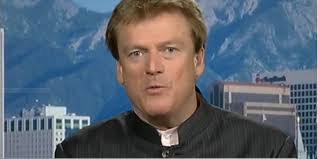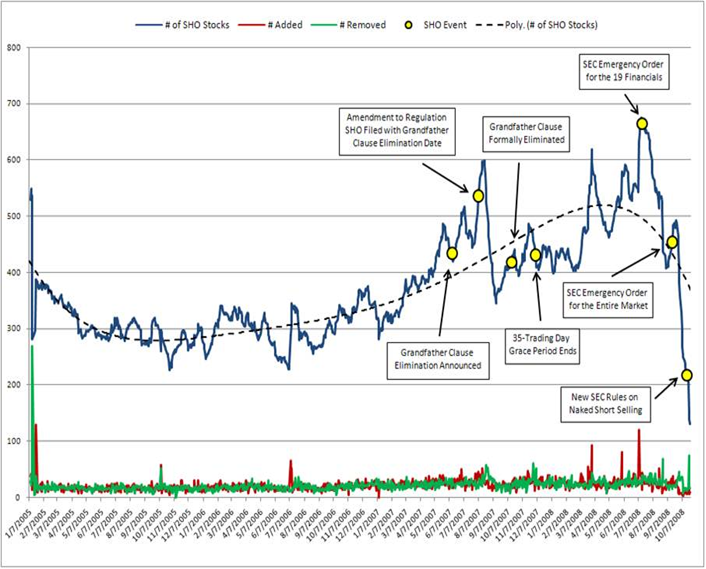In mid-2004 the Securities & Exchange Commission (itself a kind of a joint venture of the US federal government and Wall Street) adopted Regulation SHO. Among other things, “Reg SHO” insisted that exchanges publish the names of firms being victimized by naked short selling. They left plenty of loopholes (grandfathering, offshore failures, option market making abuse) and used lots of weasel-words to say it, and courteously stipulated no penalties for failing to follow the rules, and gave everybody until January 2005 to figure out new ways around them, but tepid though these measures were, curtailing naked short selling was their basic thrust.
This graph registers the daily total of companies appearing on the Reg SHO list.
=================================================================
I have maintained all along that naked short selling was not a hard problem to solve: it was just a hard problem to solve without seeing about 20 rich guys get their asses handed to them. And because they were rich and well-connected, efforts to persuade the federal government to enforce the law were stopped dead in their tracks.
Somewhere in the middle of 2008, after the horses bolted from the barn, the barn collapsed, the barn burned, and the barn’s ashes scattered to the four winds, the federal government decided to close the barn door. They enacted a subset of the reforms which Deep Capture and a handful of other activists had been suggesting for a few years. The data suggests those reforms are working. I would not stake money on the likelihood that this means much, but hope springs eternal….






OK. So, the SHO list is drying up. But, we know that multiples of the float are out there: where is the squeeze?
How are they hiding the fails. Come on. Give. They didn’t hide the Volkswagen fails very well. How are they doing the others?
Q:How are they hiding the “rest” of the fails?
A:EX-CLEARING
http://www.telegraph.co.uk/finance/newsbysector/transport/3281888/Hedge-funds-lose-billions-as-VW-share-price-dives.html
Some of the funds affected include London-based Odey Asset Management and Marshall Wace, as well as US giants including GreenLight Capital, SAC Capital, Perry Capital and Glenview.
One fund said: “In any other country in the world, taking control of a company in secret and still not launching a bid would be illegal. We believe the reactions of the German regulators to be criminally irresponsible but we are confident that this will be sorted out.” Another said: “We are stunned by the unregulated nature of the German market. This is a complete fiasco. Forget buying a Porsche, traders around the world will simply avoid Germany after this.”
the irony is lost on them, no?
pickledshark-no the irony is not lost on them. They just figure the irony is lost on the rest of the world. Present deepcapture company excluded of course.
Okay, a little fun for the conspiracy theorists.
What has the goal of the SEC been since 2003 regarding short sales? To reduce the level of fails in the system while insuring that those carrying this growing mass of liability do not become injured in the process.
The SEC created SHO in 2005 but added a grandfather clause to prevent “short squeezes” that would over-inflate the markets. Clearly SHO flopped as the grandfather clause became a loophole for abuses and never did anything to reduce the level of fails in the markets.
Prior to our recent market collapse, FTD’s were at their highest levels ever and no end in sight. Then came the collapse; the SEC’s “Crisis of Convenience”. As the chart shows, Reg SHO threshold securities have been in a free fall since this crisis hit our markets. As stock valuations fell so too fell the FTD’s. Exactly the opposite of what happened when stock prices increased.
Why does this phenomenon happen? Consider that a buy in to an FTD is at new market prices. When an FTD is created to an appreciating market the buy-in for closeout will come at a loss to somebody. But when an FTD is enacted in a falling market the buy-in is easily completed because the closeout will be at a price below what the trade was executed at.
So what this awesome illustration provides us is the insight into how egregious Wall Street regulators have been in protecting our interests. Wall Street has now proven that they can trade efficiently at high volumes; they can easily settle trades efficiently. But what they have also proven is that it only happens during a period of crisis in which it can remain financially suitable to settle trades. That makes this a conspiracy of the industry.
Wall Street is not designed to only work under adverse conditions but is intended to work during normal trading environments. This chart illustrates that the crisis of convenience allowed those that had previously committed fraud to cover their tracks and to do so profitably.
The SEC won their battle here (to settle out the $billions in unsettled trades without squeezing the sellers) but only temporarily. Until such time as regulations are put in place to maintain this efficiency under all markets we can once again expect this chart to turn when the markets turn.
Was this “The SEC’s Crisis of Convienience”?
As sent to the SEC, Members of the Media, and aides to several key Congressmen.
Friends,
According to a link on the SEC’s Website that directs you to “Key Points about Regulation SHO” the SEC presents to the public this theory:
3. Do all failures to deliver reflect improper activity that should be closed out?
A “fail to deliver” occurs when a broker-dealer fails to deliver securities to the party on the other side of the transaction on settlement date. There are many justifiable reasons why broker-dealers do not or cannot deliver securities on settlement date. A broker-dealer may experience a problem that is either unanticipated or is out of its control, such as (1) delays in customers delivering their shares to a broker-dealer, (2) the inability to obtain borrowed shares in time for settlement, (3) issues related to the physical transfer of securities, or (4) the failure of a broker-dealer to receive shares it had purchased to fulfill its delivery obligations. Fails to deliver can result from both long and short sales.
Regulation SHO was designed to target potentially problematic failures to deliver. Prevention of fails is the goal of the locate requirement. Regulation SHO requires broker-dealers to identify a source of borrowable stock before executing a short sale in any equity security with the goal of reducing the number of situations where stock is unavailable for settlement. But, because the locate is usually done three days before settlement, the stock may not be available from the source at the time of settlement, possibly resulting in a fail.
Regulation SHO also requires some fail positions to be closed out. When a broker-dealer has a fail position in a “threshold security,” and that fail position has persisted for 13 consecutive settlement days, the broker-dealer must take immediate steps to close-out the fail by purchasing securities of like kind and quantity. Even market makers that have such persistent fails in threshold securities must close-out their positions.
http://www.sec.gov/spotlight/keyregshoissues.htm
I point out the use of the term “justifiable” in the initial paragraph in rationalizing why a fail to deliver exists.
Now between the period of January 2005 to June 2008 the markets experienced a continuous rise in fails to deliver with very little response by the market regulators. Utilizing excuses 1 – 4 above the regulators rationalized that failures to deliver were simply justified difficulties attributed to such problems as lost certificates by granny or delays in delivering shares by legitimate clients. Between January 2005 and June 2008 the dollar value of fails to deliver shares increased 3-fold ($3 Billion to Over $10 Billion) as calculated mark-to-market in daily aggregate fails to deliver.
But then came June 2008 and the economic market crash. There also came that emergency ban of short sales on a paltry 19 publicly traded securities; few if any being qualified as Regulation SHO securities. June 2008 became the turning point for Regulation SHO. Suddenly, as if by miracle, those lost certificates no longer became lost, granny found every last one of them. The inability for a client to deliver securities on time diminished. And Borrowed shares available for settlement could suddenly be found.
With no new regulations between June 2008 and October 2008 investors must ask why the sudden and rapid decline in the number of issuers on the Reg SHO list? What suddenly changed in the market systems to suddenly make settlement an efficient process in which excuses 1-4 no longer seem to be of concern? (Ref: Reg SHO Threshold Security Performance Chart https://www.deepcapture.com/there-was-that-so-hard/ )
The answer is simple, nothing beyond the fact that the market completely crashed between June 2008 and present allowing those massive Fails to deliver to be closed out at a significant profit. Consider that the Dow Jones rand in near 13,000 in June 2008 but fell to Near 8,000 in October. The very period in time when an equally significant decline in fails to deliver were settled.
Had the excuses 1-4 been real, the fails to deliver in a declining market would have been just as significant as that in a flat or bull market. Lost certificates are lost certificates and delays by clients in delivering shares are delays in any market. Without any regulations that altered the short sale process relative to stock locates and unavailable shares to borrow even that excuse would have existed in a declining market but, as if by miracle, none of this happened. Failed trades were easily settled after failure if necessary because the buy-ins could be executed at or below the value executed at the time of trade. So long as a trade could be settled for profit it was settled and when a market collapses settling short sales that failed was as easy as the trade itself.
This type of evidence supports the long standing contention that the ONLY reason fails to deliver persisted for such long and persistent periods of time is purely based on economics. It was not cost effective for these failed trades to be settled and so they were not. That my friends is fraud under no uncertain terms. Failing to comply with securities laws because a profit can not be made is collusion by the industry and is intent to manipulate.
I urge the Commission to address this specific issue publicly and explain how the markets could suddenly become efficient in settling trades when nothing changed except a bear raid. The public has demanded a turnaround in the settlement problems since 2005 and nothing happened until our markets crashed. Are we to believe this is purely by coincidence that the day the market started to crash was likewise the day that stocks could suddenly settle more efficiently? Where are those lost certificates that were highly touted as cause for threshold companies before this market crash?
Ultimately, I believe that this document published on the SEC Website was a blatant attempt at deceiving the investing public as to the truth behind this problem. Wall Street was ripping off investors and the Division of Trading and Markets deceived the public so as to aid the Division of Enforcement in not taking up appropriate cases against those that willfully violated the securities laws. This diversion from the truth delayed the public outcry over where the enforcement cases were.
The language is the SEC’s and the evidence is for all the public to see as Regulation SHO threshold lists are published daily.
David Patch
http://www.investigatethesec.com
Spot On Patch !!!
“Fails to Deliver” Plummet at Nasdaq
http://www.tradersmagazine.com/news/102374-1.html
By Nina Mehta
October 31, 2008
Nasdaq Stock Market has seen its list of securities with large amounts of fail-to-deliver shares resulting from short sales plummet in the wake of the Securities and Exchange Commission’s mid-September penalty on broker-dealers that allow fails.
According to Robert Greifeld, president and CEO of Nasdaq OMX Group, Nasdaq had reached a high of 443 stocks on its “threshold list” of securities prior to the SEC’s September 17 Emergency Order laying out the Commission’s new requirements. The threshold list includes stocks with failures to deliver for at least five settlement days exceeding 10,000 shares and half of one percentage point of the stock’s outstanding shares.
Earlier this week there were 95 stocks on that threshold list, Greifeld said, and the “full impact” of the SEC’s rule has not yet been felt. (Nasdaq’s threshold list yesterday included 59 names.) Greifeld noted that he expected the threshold list to drop to the “low single digits” in the coming weeks. The exchange executive made these comments at the Securities Industry and Financial Markets annual meeting in New York on Tuesday.
Greifeld told reporters after his talk that the “rules put in place are working with respect to [naked] short selling.” Naked short selling refers to short sales executed with no intention to borrow the shares needed to settle the transaction on the settlement date, which is T+3. The SEC has said repeatedly in recent months that potentially abusive naked short selling can disrupt and harm the securities markets.
Duncan Niederauer, CEO of NYSE Euronext, also commented on the SEC’s new T+3 requirements at the SIFMA conference. Referring to the SEC’s introduction of a penalty, Niederauer he said that “that alone is the best thing we could have done” to reduce potentially abusive naked short selling. He added that the T+3 delivery requirements, which had been on the books for some time, previously “were not adequately enforced.”
Both Greifeld and Niderauer said they supported the SEC’s new T+3 penalty. That penalty is due to expire next July.
On September 18, a day before it temporarily banned short selling in financial stocks, the SEC implemented Rule 204T of Reg SHO, which it had announced the prior day in an Emergency Order. Rule 204T imposed a penalty on brokers with fail-to-deliver positions resulting from short sales. Those brokers cannot execute new short sales in stocks that fail to settle by 9:30 a.m. on T+4 without first borrowing or “pre-borrowing” the shares needed for those transactions, until the existing failed position is settled. At a minimum, that would be T+6. The pre-borrow penalty therefore makes future trades more costly and cumbersome for brokers.
The Emergency Order lapsed on October 17, but the SEC implemented Rule 204T as an immediately effective “interim final temporary rule” that expires on July 31, 2009. In its interim final temporary rule, the SEC commented that “notice and public procedure in advance of effectiveness of the rule are impracticable, unnecessary, and contrary to the public interest.” The SEC is now accepting comments on this rule and will have to decide, before next July, whether to continue the rule, modify it or scrap it altogether.
The SEC’s stringent September 17 Emergency Order, Greifeld said, “is the right philosophical market structure in place today” to address naked short selling. He told reporters that he thought the SEC should keep the penalty in place after next July. He added that he did not think the SEC should extend the time before the penalty is imposed to T+4 or T+5, as some in the industry have suggested.
For more information on related topics, visit the following:
Exchanges and ECNs
Brokerage
Regulation
Dr. Byrne is right on! He is a real danger to the imbedded greed which is ripe in throughout America today. Not only does he have God given intelligence but also a spiritual courage which ranks up there with the prophets. You are in my prayers Patrick. America needs more patriots like you. God bless you. Revelation 18:2-3
Your mode off describing the whole thing in this piece of riting is really nice, every oone be capable of without difficylty
know it, Thamks a lot.